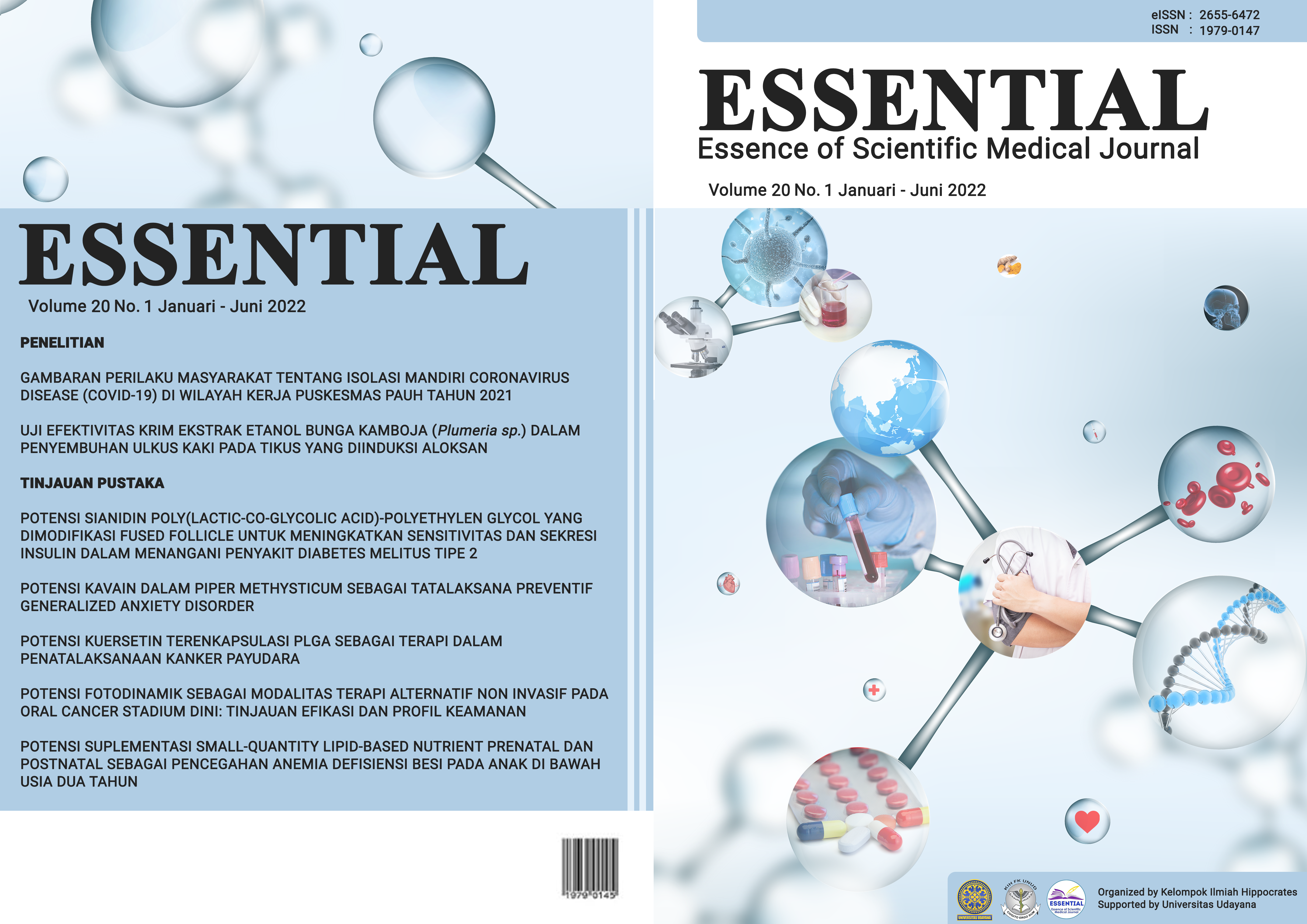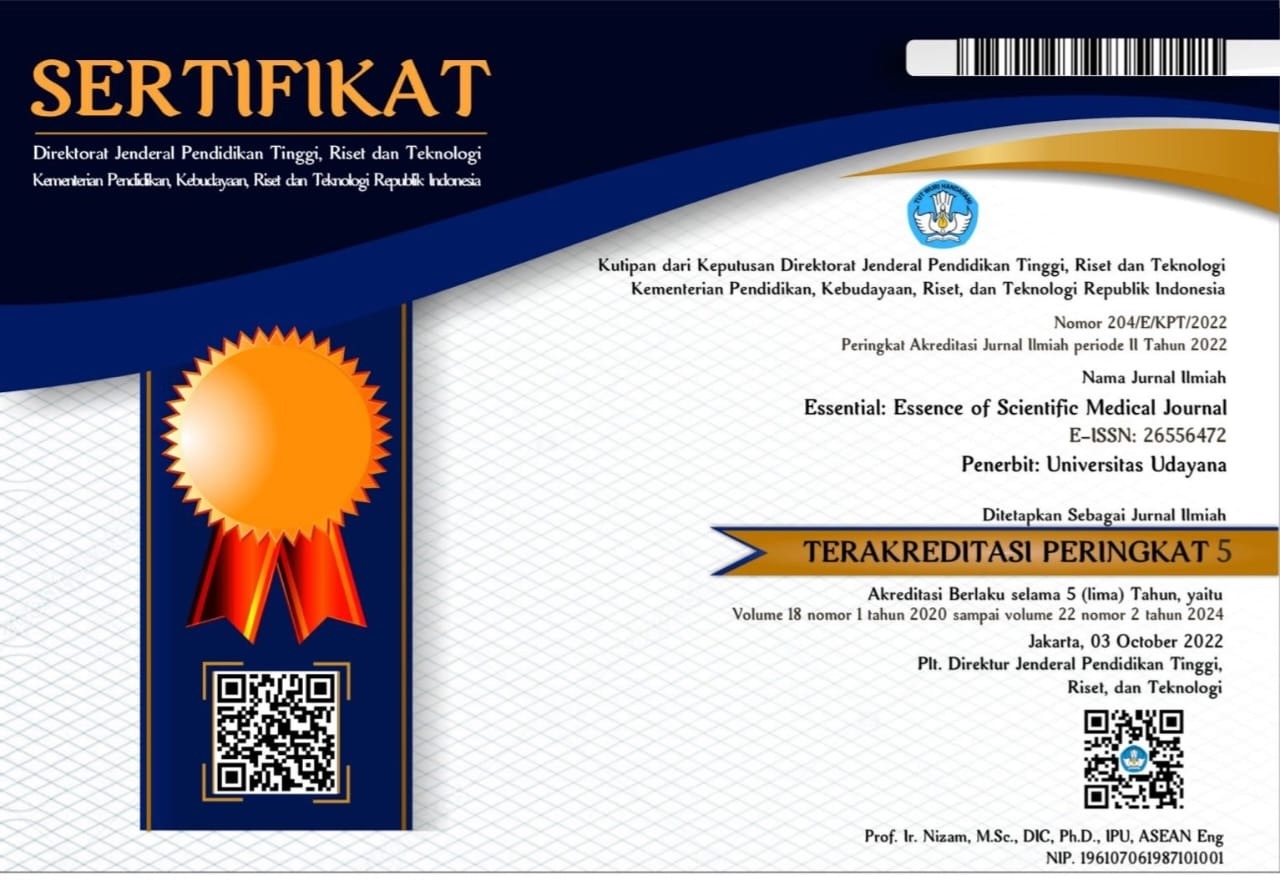GAMBARAN PERILAKU MASYARAKAT TENTANG ISOLASI MANDIRI CORONAVIRUS DISEASE (COVID-19) DI WILAYAH KERJA PUSKESMAS PAUH
Abstract
Introduction: Coronavirus Disease-19 (COVID-19) was a disease caused by SARS-CoV-2. The positivity rate for COVID-19 at the Pauh Health Center until August 2021 reached 34.95%. Most of the people lived in Pauh who have been confirmed COVID-19 were self-isolating.
Method: This study used a political and logical approach with descriptive and cross-sectional design. The research was conducted from August – September 2021 in Cupak Tangah, South Limau Manis, and Koto Luar. The research data was obtained by filling out the respondent's questionnaire and guided interview.
Result: The problem found using the Hanlon method was the high positivity rate of COVID-19 at the Pauh Health Center. This was due to several factors, such as the lack of public knowledge about COVID-19 and self-isolation, lack of awareness in implementing health protocols, lack of concern and negative stigma towards people who are confirmed to have COVID-19, lack of strict supervision of health protocols by cross-sectors, and obstacles in purchasing. Standard Personal Protective Equipment (PPE).
Discussion: Health promotion with modules was chosen based on the demographic and geographical conditions of the Pauh with the aim of providing an understanding of self-isolation. Other activities carried out are socialization and evaluation in the form of pre and post tests targeting the community, health workers, and officials in the Pauh.
Conclusion: The solution to the high COVID-19 positivity rate in the Pauh Health Center work area was to form an independent isolation module using the Plan, Do, Check, and Action (PDCA) flow, making this module can be an outcome in helping to improve people's behavior and educating the public to behave well according to the rules.
Keywords: COVID-19, module, primary health care, self-isolation
Downloads
References
2. Ghinai I, McPherson TD, Hunter JC, et al.: First Known Person-to-Person Transmission of Severe Acute Respiratory Syndrome Coronavirus 2 (SARS-CoV-2) in the USA [Epub ahead of print]. Lancet. 2020).
3. Burhan E, Susanto AD, Nasution SA, Ginanjar E, Pitoyo CW, Susilo A, Firdaus I, et al. Pedoman Tatalaksana COVID-19. ed. 3. Jakarta. Perhimpunan Dokter Paru Indonesia. Jakarta; 2020.
4. Li Q, Guan X, Wu P, et al.: Early transmission dynamics in Wuhan, China, of novel coronavirus-infected pneumonia [Epub ahead of print]. N Engl J Med. 2020.
5. Kementerian Kesehatan Republik Indonesia. Pedoman Pencegahan dan Pengendalian Coronavirus Disease (COVID-19). Revisi ke 5. Jakarta; 2020.
6. World Health Organization [2021]. Diakses 11 September 2021 - Available at : https://covid19.who.int/
7. Badan Nasional Penanggulangan Bencana Republik Indonesia. Keputusan Kepala BNPB No. 13 A Tahun 2020 Tentang Perpanjangan Status Keadaan Tertentu Darurat Bencana Wabah Penyakit Akibat Virus Corona di Indonesia. Jakarta: BNPB; 2020.
8. Provinsi Sumatera Barat [2021]. Diakses 11 September 2021. Available at : https://corona.sumbarprov.go.id/
9. Dinas Kesehatan Kota Padang [2021]. Diakses 11 September 2021 - Available at : https://dinkes.padang.go.id/covid19).
10. Direktorat Jenderal Pelayanan Kesehatan Primer. Petunjuk Teknis Pelayanan Puskesmas pada Masa Pandemi COVID-19. Jakarta: Kemenkes RI; 2020.
11. Menteri Kesehatan Republik Indonesia. Permenkes No. 43 Tahun 2019 Tentang Puskesmas. Jakarta: Kemenkes RI; 2019.
12. Bloom BS. Taxonomy of educational Objective : The Classification of Educational Goals, Handbook I Cognitive Domain. New York: Longmans, Green and Co; 1958.
13. Kementerian Kesehatan Republik Indonesia. Buku Panduan Germas. Jakarta: Kemenkes RI; 2016.
14. Puskesmas Pauh. Laporan Tahunan Puskesmas Pauh Tahun 2020. Padang: Puskesmas Pauh; 2021.
15. Puskesmas Pauh. Laporan Cohort COVID-19 Puskesmas Pauh Tahun 2020-2021. Padang: Puskesmas Pauh; 2021.
16. Notoatmodjo S. Ilmu Perilaku Kesehatan. Jakarta: Rineka Cipta; 2014.
17. Adam A, Wintoni E. Pengaruh Media Promosi Kesehatan Terhadap Perilaku Kesehatan Pada Remaja Pelajar Kelas XI di SMA Negeri 1 Pangkajene Tahun 2015. Med Kom Kes FKM UPRI Makassar. 2016;81:1-9.
18. Winkel WS, Psikologi Pengajaran. Jakarta: Grasindo; 2014.
19. Novia WP, Septia PR. Edukasi Kesehatan untuk Isolasi Mandiri dalam Upaya Penanganan COVID-19 di Kanagarian Koto Baru, Kabupaten Solok. Jurnal Abdidas. 2020;1:547-53.
20. Tri AS, Nur KA, Jihan FS, Diah K, Dluhyatuz Z, Muhammad IM. Pengembangan Buku Saku COVID-19 Elektronik untuk Mendukung Edukasi Pencegahan COVID-19. Jurnal Universitas Negeri Semarang. 2019;2:21-9.
21. Yuliana Y. Corona Virus Diseases (COVID-19); Sebuah Tinjauan Literatur (skripsi). Lampung: Fakultas Kedokteran Universitas Lampung; 2020.
22. Suni NSP. The High Number of Active Cases and Fatality Rate Due to COVID-19 in Indonesia. Research Center, Expertise Agency of DPR RI. 2021;13:13-8.


 SUBMISSION
SUBMISSION
















